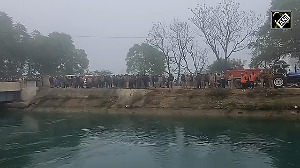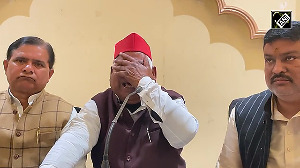''Trade imbalance, sharing of river waters and security issues are expected to be high on the agenda of the two leaders during their meeting,'' the sources added.
This will be the first meeting between the two leaders after Bangladesh was rocked by serial blasts in August and the Indian capital of New Delhi witnessed bombings on October 29.
Sources said the two leaders might also discuss ways to coordinate their efforts in the global fight against terrorism, given the fact that the entire south Asian region was grappling with the scourge.
India is worried and concerned about the presence in Bangladesh of the activists of various insurgent groups, actively involved in spreading terror in the Northeastern states. The recent spurt in the activities of fundamentalist elements in this country has been a cause of concern for the Indian government. After Bhutan cracked down on the United Liberation Front of Asom and other militant groups, some of their actvists and leaders have taken refuge in Bangladesh.
India has already submitted to Dhaka a list of 172 insurgent groups including their leaders, who have taken refuge in Bangladesh and has sought their early deportation. However, Bangladesh has denied the presence of Indian insurgent groups on its soil, despite evidence to the contrary.
Another contentious issue that has caused tension between the two countries is the illegal migration of a large number of Bangladeshis to India.
Although both countries have agreed to increase coordinated patrolling along their 409-kilometre border, the question of fencing remains unresolved with Bangladesh resisting the move.
It was agreed to strengthen border security between the two countries but illegal migration continues unabated.
Bangladesh, meanwhile, wants to emphasise the economic content of the bilateral relationship with India. It has been pressing for reducing the trade imbalance and lifting of trade barriers.
| |||||||||||
''We have no major problem with India which cannot be resolved through discussion. Most of our problems with Bangladesh are in the nature of irritants. These are no big problems that we can't resolve,'' Mr Raaz Rehman, Adviser on Foreign Affairs to the Bangladesh Government said.
India and Bangladesh have recently agreed to provide consular access to arrested insurgents and criminals on reciprocal basis, besides sharing information about their actvities. The two countries also decided to closely work on security related issues.
While Bangladesh agreed to consider the proposal for an extradition treaty and a treaty on mutual assistance in criminal matters, India has already given the drafts of the two documents to Dhaka in September 2004.
Dr Singh is also expected to discuss bilateral and regional matters with Begum Khaleda. The Home Secretaries of India and Bangladesh, who met in New Delhi two weeks ago, also discussed the problem of illegal cross-border movement. It was decided that there was an urgent need to come out with a mechanism to check it.
India's strong concerns over north-eastern insurgent groups continuing its operations from Bangladesh are expected to be raised during the meeting in Dhaka. Bangladesh has been strongly pleading for pragmatic steps to rectify the trade imbalance, sharing of the flows of Teesta and six other rivers and demarcation of a 6.5 kilometre portion of the India-Bangladesh border.
India wants corridor facilities and a gas pipeline through Bangladesh which has set pre-conditions seeking New Delhi's nod for allowing transit of direct export of goods from this country to Nepal and Bhutan as also import of hydropower from Bhutan. "We have no major problems with India which cannot be resolved through discussions," Foreign Affairs Advisor Reaz Rahman said in Dhaka.






 © 2025
© 2025